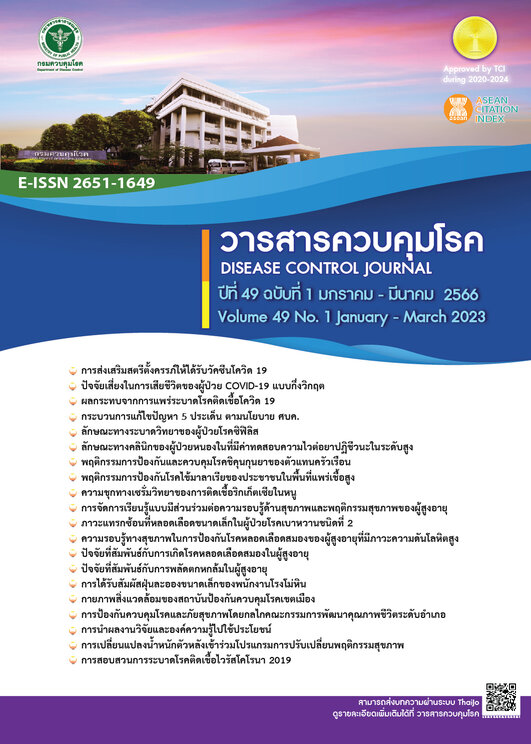Factors related to malaria prevention behavior of people in high transmission areas of Prachuap Khiri Khan province, Thailand
DOI:
https://doi.org/10.14456/dcj.2023.8Keywords:
related factors, malaria, Malaria prevention behaviors, high transmission areasAbstract
Malaria has been a serious public health concern of Thailand, especially along the border and forested areas. This cross-sectional survey research aimed to study factors related to the malaria prevention behaviors of people in high transmission areas of Prachuap Khiri Khan Province, Thailand. PRECEDE Model and Health Belief Model were utilized as a conceptual framework. The sample were 400 persons aged 15 years and over in high transmission areas who were selected by multistage random sampling. Data were collected by interview questionnaires in April 2021. Descriptive and inferential statistics consisting of Chi-square test and Pearson product-moment correlation were used for testing hypothesis. The results revealed that 75.2% of people in high transmission areas had a low level of overall disease prevention behaviors. Twenty-three factors were significantly related to malaria prevention behaviors (p<0.05). Fourteen out of these 23 factors were personal characteristics, history of illness with malaria, and residential environments. Five predisposing factors were malaria prevention knowledge, perceived susceptibility of malaria, perceived severity of malaria, perceived benefits of malaria prevention, and perceived barrier of malaria prevention. Three enabling factors were access to health services, sufficiency of resources to prevent mosquito bites, and obtaining information about malaria, whereas one reinforcing factor was social support. Therefore, public health agencies should be more proactively to encourage people to have correct knowledge and belief. Providing services that facilitate access to preventive materials and increase opportunities for the people and village health volunteer networks to continuously participate in the prevention and control malaria in high transmission areas.
Downloads
References
World Health Organization. World Malaria Report 2019. World Health Organization: Geneva; 2019.
International Cooperation Development Group International Cooperation Agency. Guidelines for border health operations to support the entry into the ASEAN Community 2014. Nonthaburi: Department of Disease Control; 2014.
Division of Vector Borne Disease (TH). Thailand malaria elimination program [Internet]. 2020 [cited 2020 Jul 20]. Available from: http://malaria.ddc.moph.go.th/malariaR10 (in Thai)
Office of Disease Prevention and Control Region 5 Ratchaburi. Annual report 2019. Ratchaburi: Office of Disease Prevention and Control Region 5 Ratchaburi; 2019.
Seehawong W, Lailuang W, Wongpirom R. People’s Behaviour Regarding the Prevention and Control of Malaria on the Borders between Thailand, Laos and Cambodia in Ministry of Public Health Inspection Region 11th and 14th. Office of Disease Prevention and Control Region 7 Ubon Ratchathani. 2006;6(1):7.
Pradit P. Meta analysis of factors associated with malaria prevention behavioral to follow the health belief model and social support theory (dissertation). Bangkok: Thammasat University; 2015. 160 p. (in Thai)
Muernrat Y, Suwannarat S, Suwan V. Factors related to malaria treatment delay in Surat Thani Province. J Vector Borne Dis. 2006;7(2):1-11.
Sawang S, Siwirot P. Factors related to delayed malaria treatment seeking in Mae Hong Son Province (dissertation). Chiang Mai: Chiang Mai University; 2014. 131p. (in Thai)
Wayne WD. Biostatistic: A foundation for analysis in the health sciences. 9th ed. New York: John Wiley & Sons; 2010.
Bloom BS. Taxonomy of Education Objectives, Hand Book 1: Cognitive Domain. New York: David Mckay Company; 1984.
Shimaponda-Mataa NM, Tembo-Mwase E, Gebreslasie M, Mukaratirwa S. Knowledge, attitudes and practices in the control and prevention of malaria in four endemic provinces of Zambia. S Afr J Infect Dis. 2017;32(1):29-39.
Kawewandee N, Sirisawang V, Boriharn S. Factors relating to the participation of people in prevention and control of dengue hemorrhagic fever in Nakornjaedee Subdistrict Pasang District, Lamphun Province (Doctoral dissertation). Chiang Mai: Chiang Mai Rajabhat University; 2013. 123 p. (in Thai)
Ugwu EO, Ezechukwu PC, Obi SN, Ugwu AO, Okeke TC. Utilization of insecticide treated nets among pregnant women in Enugu, South Eastern Nigeria. Niger J Clin Pract. 2013;16(3):292-6.
Ouattara AF, Raso G, Edi CV, Utzinger J, Tanner M, Dagnogo M, Koudou BG. Malaria knowledge and long-lasting insecticidal net use in rural communities of central Côte d'Ivoire. Malaria journal. 2011;10(1):1-2.
Mazigo HD, Obasy E, Mauka W, Manyiri P, Zinga M, Kweka EJ, et al. Knowledge, attitudes, and practices about malaria and its control in rural northwest Tanzania. Malar Res Treat. 2010. doi.org/10.4061/2010/794261
Premsri N, Chinanonwet N, Sudathip P, Naing T, Sokanket S. Evaluation of coverage and usage of malaria prevention methods and associated malaria risk factors among population in area with malaria transmission in Thailand. Department of Disease Control. Ministry of Public Health, 2013.
Musikarat P. Factors related to preventive behaviors toward malaria among people who live in the Thailand-Cambodia frontier in Borai District, Trat Province (dissertation). Chonburi: Burapha University; 2009. (in Thai)
Becker MH, Drachman RH, Kirscht JP. A new approach to explaining sick-role behavior in low-income populations. Am J Public Health. 1974;64(3):205-16.
Nuwaha F. Factors influencing the use of bed nets in Mbarara municipality of Uganda. Am J Trop Med Hyg. 2001;65(6):877-82.
Hanbungkla S, Charerntanyarak L. Factors associated with malaria infection of endemic area in 2015, Ratchaburi province. Dis Control J. 2017;43(4):423-35. (in Thai)
Neawraj A. Factors affecting the malaria preventive behavior of border patrol police at Police Sub-Division camp 34, Tak Province (dissertation). Bangkok: Srinakharinwirot University; 2007. 118 p. (in Thai)
Downloads
Published
How to Cite
Issue
Section
License
Copyright (c) 2023 Disease Control Journal

This work is licensed under a Creative Commons Attribution-NonCommercial-NoDerivatives 4.0 International License.
Articles published in the Disease Control Journal are considered as academic work, research or analysis of the personal opinion of the authors, not the opinion of the Thailand Department of Disease Control or editorial team. The authors must be responsible for their articles.






